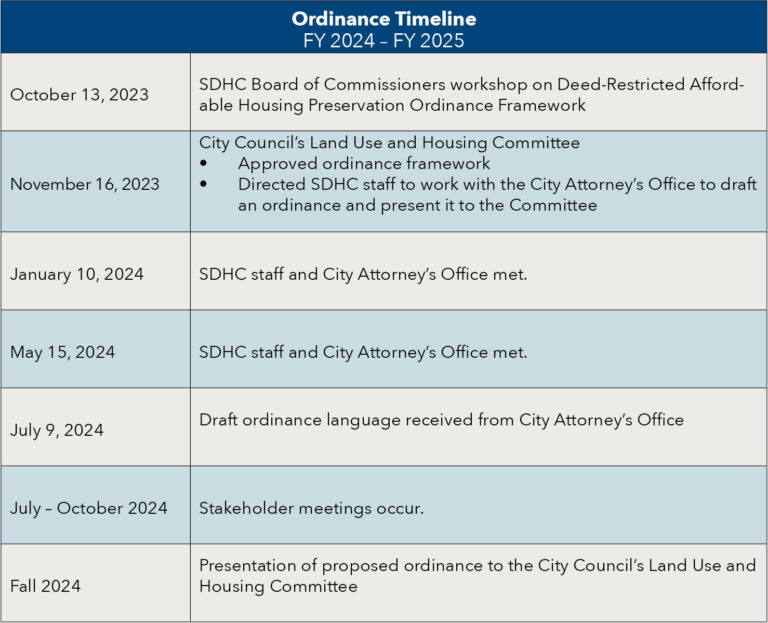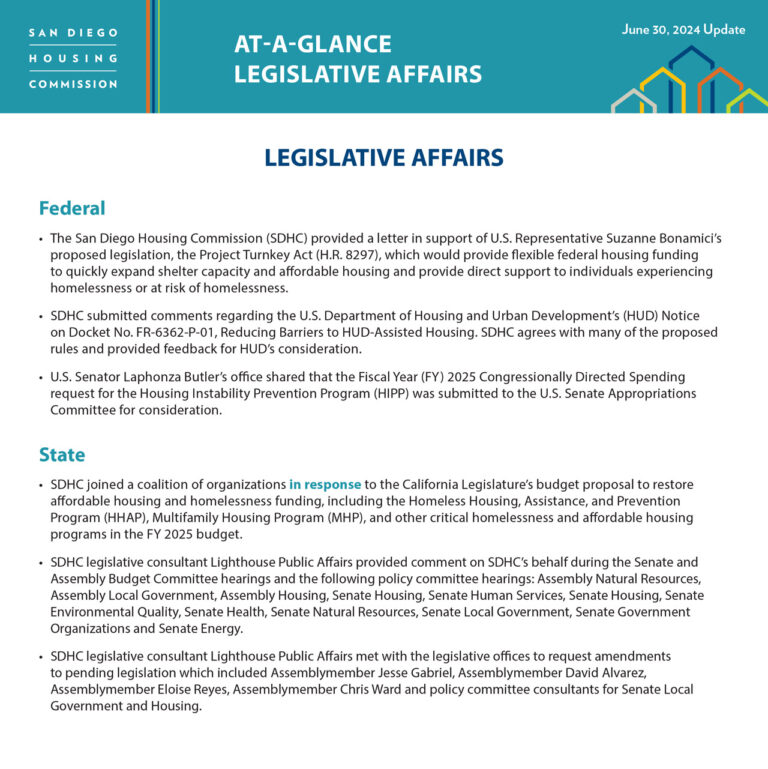LEGISLATIVE AFFAIRS
Legislative and regulatory activities at all levels of government have the potential to affect the San Diego Housing Commission (SDHC) and the thousands of households SDHC serves through its rental assistance, homelessness solutions and affordable housing programs.
To advance policies consistent with SDHC’s vision, mission, purpose, core values and strategic priorities, SDHC engages with elected leaders and officials at local, state and federal levels of government, as well as stakeholders. SDHC also monitors legislative and regulatory activities closely to identify issues and legislation that could affect the individuals and families SDHC’s programs serve. Additionally, SDHC provides policy recommendations to address a variety of issues.
Legislative Engagement Guide
Each year, SDHC prepares a guide to help foster progress toward SDHC’s vision, to guide how advocacy-related decisions are made, to illustrate the agency’s legislative platform direction, and to help garner support and secure funding for SDHC’s core work. On December 13, 2023, the Housing Authority of the City of San Diego approved SDHC’s Calendar Year 2024 State and Federal Advocacy and Legislative Engagement Guide.
Affordable Housing Preservation Ordinance
Throughout Fiscal Year (FY) 2024 (July 1, 2023 – June 30, 2024) and into FY 2025, SDHC continued its progress toward the creation of a City of San Diego ordinance to support the preservation of deed-restricted affordable rental housing units. The creation of an Affordable Housing Preservation Ordinance was one of seven actions the San Diego City Council approved in October 2020 to implement a strategy for affordable housing preservation in the City. The seven actions emerged from discussions based on the SDHC report “Preserving Affordable Housing in the City of San Diego,” published in May 2020.
Study of Residential Evictions
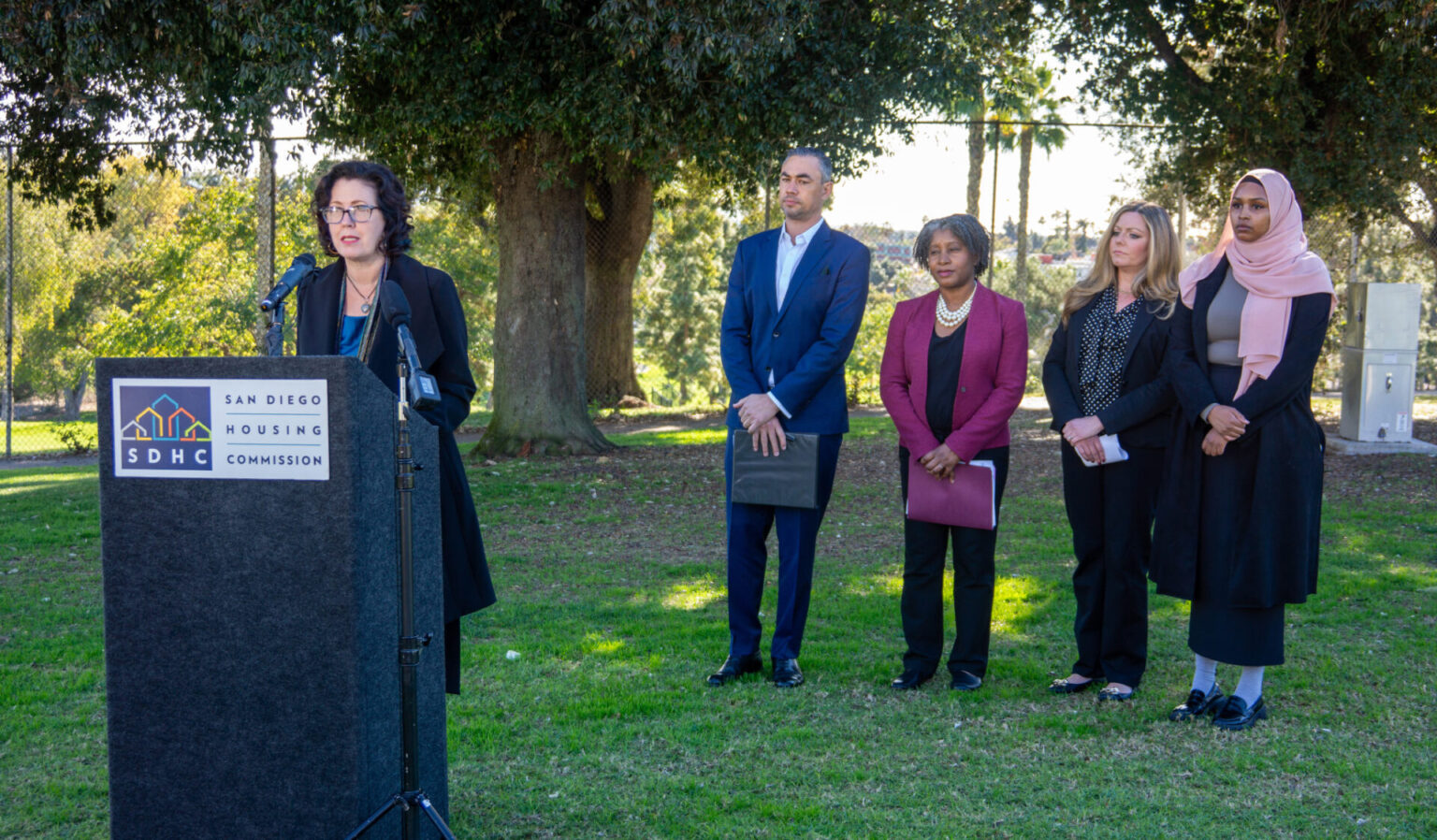
An SDHC study of residential eviction trends in the City of San Diego—published on SDHC’s website on January 11, 2024—identified that communities with lower income, higher rental cost burden, a higher proportion of Black and Hispanic households, more single-parent households, and higher unemployment levels are more likely to experience evictions.
The study may inform the evaluation and development of opportunities to potentially strengthen existing eviction prevention and housing stability initiatives in the City of San Diego. In January and February 2024, respectively, SDHC staff and HR&A Advisors presented informational workshops about the study to the SDHC Board of Commissioners and the San Diego City Council’s Land Use and Housing Committee.
SDHC initiated the study in February 2023, as households began to face potential evictions in greater numbers upon the conclusion of federal assistance and renter protections implemented during the COVID-19 pandemic. SDHC completed the study in consultation with HR&A Advisors, a public policy firm with more than 40 years of experience in real estate and economic development.
The study also found that the geographic distribution of evictions remained consistent year over year. Central and Southeastern San Diego have historically faced the highest levels of evictions (Downtown San Diego, Southeastern San Diego, Otay Mesa, City Heights, Mission Valley and Tierrasanta). Neighborhoods with a higher share of Black and Hispanic residents, single-parent households, and residents who are unemployed were also more likely to experience higher rates of evictions (Southeastern San Diego, Barrio Logan, Encanto, Valencia Park, Lomita, Otay Mesa, and Nestor).
SDHC announced the study’s findings at a news conference with City Council President Sean Elo-Rivera; SDHC President and CEO Lisa Jones; Joanne Franciscus, the CEO and Executive Director of Legal Aid Society of San Diego, which operates the City’s Eviction Prevention Program through a contract with SDHC; and Judith Taylor, a Partner at HR&A Advisors, Inc.
Key takeaways from the study also included that community-based nonprofits, cultural organizations and religious groups are essential partners in eviction prevention efforts.
Study Recommendations
- Continue focusing eviction prevention outreach, educational and service provision efforts on neighborhoods experiencing high rates of evictions.
- Consider opportunities to strengthen existing tenant protections.
- Continue to assess the usefulness of and opportunities to enhance the Tenant Termination Notice Registry after completion and implementation of the registry.
- Explore options to enhance the Unlawful Detainer Court Case Database and deepen understanding of those affected.
- Explore the development of benchmarks and targets for the City of San Diego Eviction Prevention Program (EPP) to support the understanding of whether existing outreach efforts and service provision are meeting community needs sufficiently.
- Explore potential avenues and advocate for increased resources to bolster financial assistance programs, particularly emergency rental assistance.
- Continue partnering with and supporting capacity building of the Eviction Prevention Collaborative (EPC).
- Consider an eviction-focused, citywide needs assessment.
- Continue to focus on ways to increase preservation, production and access to affordable housing through a “whole-system” approach.
Roundtable Discussion on Youth Mental Health
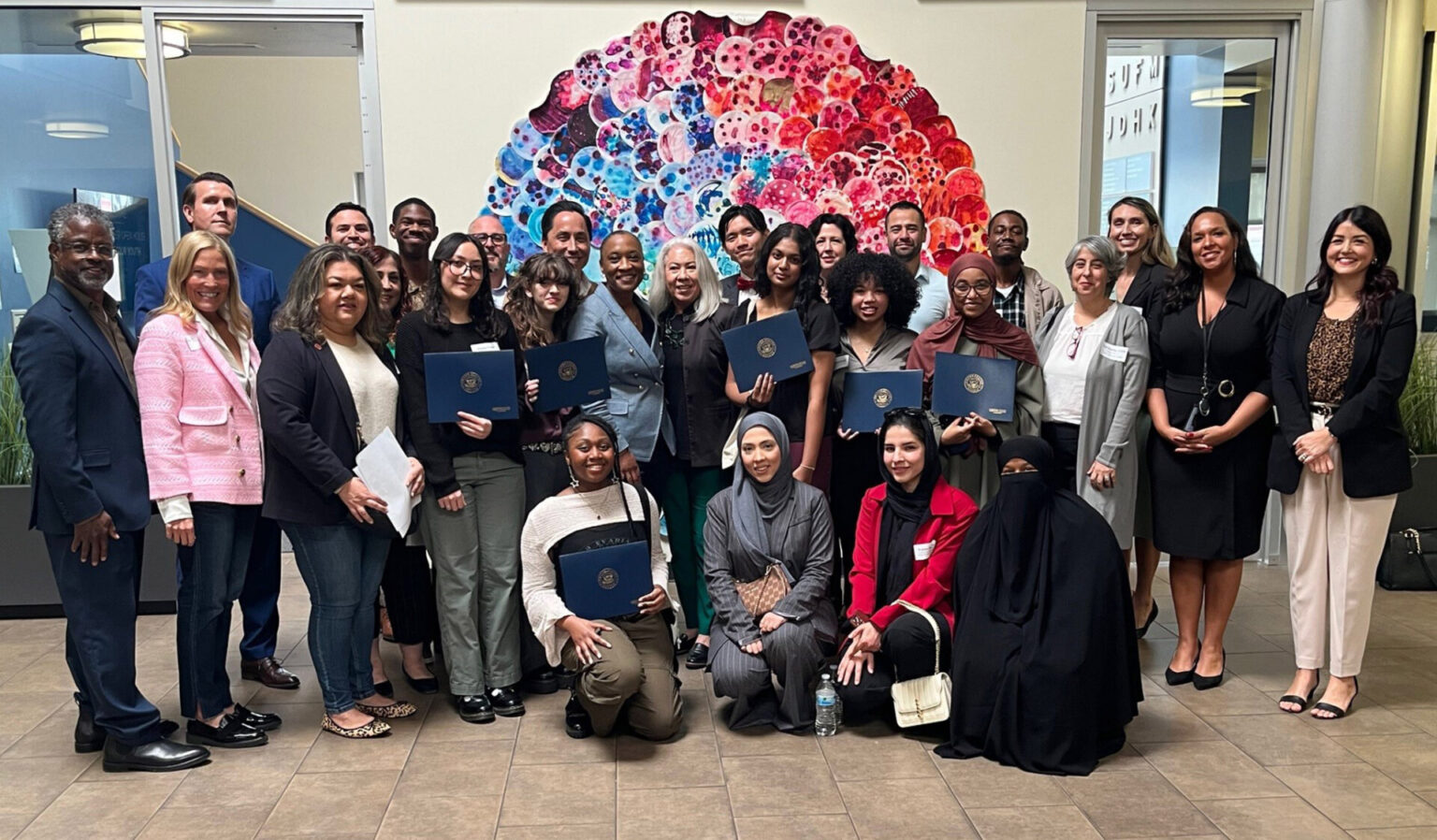
SDHC President and CEO Lisa Jones joined U.S. Senator Laphonza Butler’s roundtable discussion on mental health among youth on January 14, 2024, at the Monarch School, one of the few schools in the nation specifically for children experiencing homelessness. Senator Butler, San Diego Mayor Todd Gloria, SDHC CEO Jones and representatives from mental health organizations heard directly from current and recently graduated high school students about their perspectives, experiences and activism related to mental health issues. Stable housing is essential for quality of life, mental health and wellness. One of SDHC’s initiatives through its status as a Moving to Work public housing authority is the Monarch School Project, through which SDHC provides rental housing vouchers for up to 25 families who have at least one child enrolled at the Monarch School.
Ending Homelessness Summit
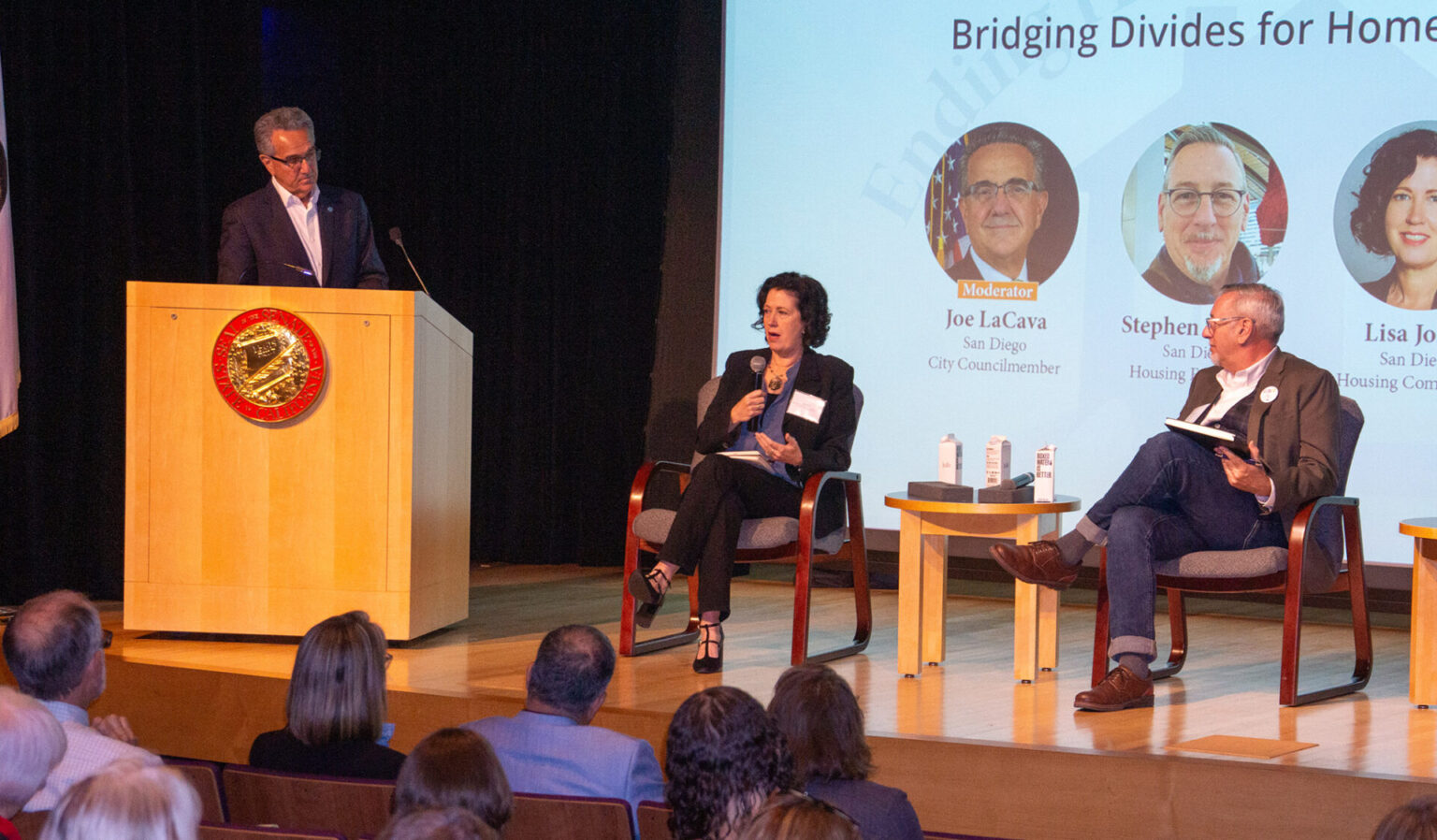
Approximately two months before she was appointed to be SDHC’s President and CEO, Lisa Jones represented SDHC in her role as Executive Vice President of Strategic Initiatives at the time on a panel discussion at the “Ending Homelessness Summit,” organized by California State Senator Catherine Blakespear. Discussions included: homelessness prevention efforts and focusing on populations known to be a high risk; understanding that people experiencing homelessness are neighbors, seniors, college students, veterans and others who are part of the community; ensuring that community engagement about affordable housing developments and housing for people experiencing homelessness continue after the development is completed; and the potential for public-private partnerships with employers and commercial developers to assist with the creation of workforce housing.
Additional panelists included San Diego City Councilmember Joe LaCava; San Diego Regional Task Force on Homelessness CEO Tamera Kohler; San Diego Housing Federation President & CEO Stephen Russell; University of California San Francisco Professor Dr. Margot Kushel; California Interagency Council on Homelessness Executive Officer Meghan Marshall; California Housing Partnership Director of Advocacy Mark Stivers; Downtown San Diego Partnership President & CEO Betsy Brennan; and Jamboree Housing Corporation Vice President of Business Development Kelsey Brewer.
UPDATE: HUD Tour of SDHC Collaborative Development Property
Peter Hunter, Assistant Deputy Secretary for Field Policy and Management for the U.S. Department of Housing and Urban Development (HUD) toured the award-winning affordable rental housing development Encanto Village on August 14, 2024. HUD’s HOME Investment Partnerships Program funded most of the approximately $1 million loan SDHC awarded to support the development of the 65 affordable rental apartments at Encanto Village. SDHC also awarded eight HUD Veterans Affairs Supportive Housing (VASH) vouchers to Encanto Village, which help pay rent for veterans who previously experienced homelessness. National CORE developed Encanto Village, which celebrated its grand opening in 2020, and the Hope through Housing Foundation provides on-site services for residents.
Advocacy and Engagement
SDHC summarizes its advocacy and engagement activities throughout the fiscal year in “at a glance” reports updated monthly on SDHC’s website. These include the efforts of SDHC’s legislative consultant, Lighthouse Public Affairs, on SDHC’s behalf.
Meetings with lawmakers or their staffs and many letters of support on multiple bills affecting housing and homelessness programs and initiatives, are among the extensive legislative advocacy and engagement activities in which SDHC participated throughout Fiscal Year 2024. Additional details are included in the Appendix of SDHC’s FY 2024 Annual Report.
